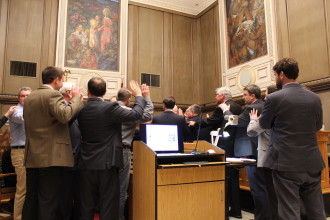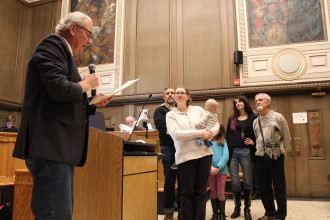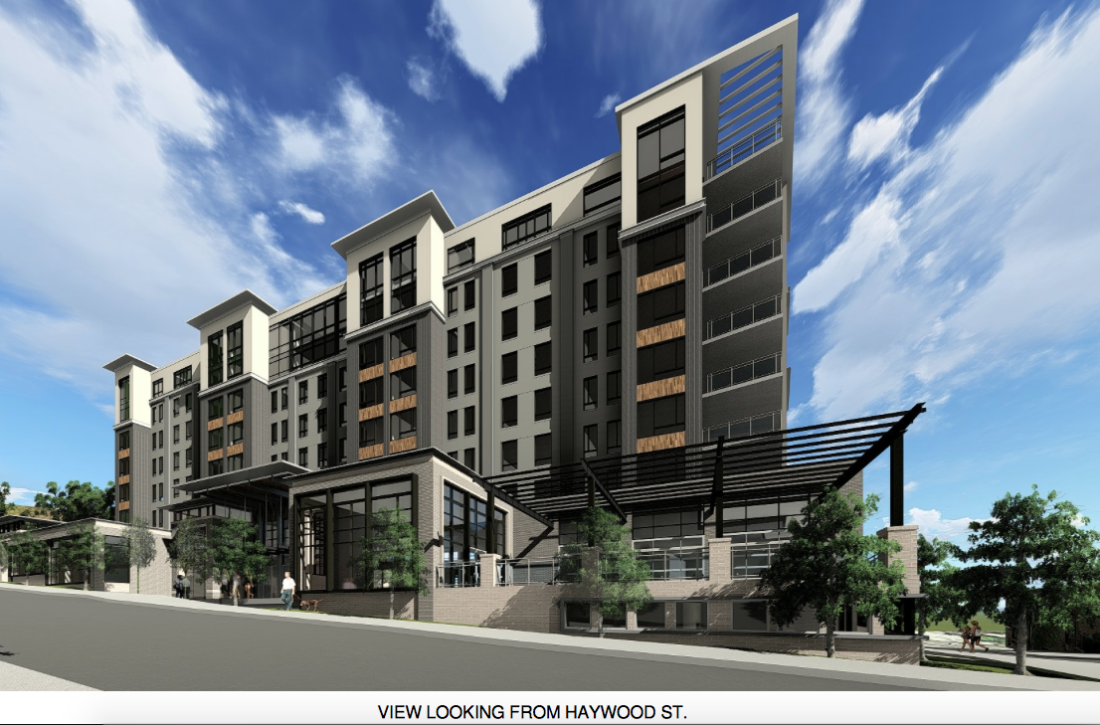Years into a downtown hotel development boom that’s brought hundreds of new rooms to Asheville, City Council voted last night to deny a 185-room Embassy Suites Hotel proposed for 192 Haywood St. Following nearly three hours of presentations from the developer and testimony from the public, the vote, when it came, was brief and unanimous in its opposition.
After Vice Mayor Gwen Wisler‘s motion to deny the zoning request, Council member Julie Mayfield said while she saw some positives in the proposed hotel, “I think it would be unfortunate to lose the opportunity to address the lack of parking and the general traffic concerns in that part of downtown.”
Council’s hearing was conducted as a quasi-judicial process as required for a Conditional Use Permit. Those wishing to speak on the project were sworn in by City Clerk Maggie Burleson before the hearing began at around 6:45 p.m. A court reporter transcribed the proceedings, a measure seen by some attendees as a sign that the developer, Parks Hospitality Group, was laying the groundwork for challenging the outcome in court if Council’s decision didn’t go their way.
Asheville attorney Bob Oast introduced the project. He presented three expert witnesses, Tommy Crozier of Cushman & Wakefield’s Charlotte office, a commercial real estate appraiser; Kevin Dean of Kimley-Horn in Raleigh, a traffic engineer; and Blake Esselstyn of FrontWater LLC, an Asheville-based planner. Other members of the developer’s project team who spoke included Mike Dale of Anchor QEA (formerly Altamont Environmental), Bill Zehrung of McMillan Pazdan Smith Architecture and Trevor Walden of Parks Hospitality Group.

Community members who testified in support of the project included Ruth Summers of the Grove Arcade, former Council member Jan Davis of Jan Davis Tire Store and Corey Atkins, vice president of public policy for the Asheville Area Chamber of Commerce.
Former Asheville City Council candidate Rich Lee pointed out that, even if it were smaller, the 192 Haywood St. project would be subject to Council’s review because it is within 500 feet of another Parks Hospitality Group project, the Hyatt Place Asheville Downtown at 199 Haywood St. Projects located within 500 feet of each other totaling over 175,000 square feet developed by the same owner within a three-year period trigger Council review. City Attorney Robin Currin clarified that this project also met the conditions for review because its size alone would require Council’s approval, without considering the company’s previous project.
Montford resident Charles Rawls testified that the vehicular entrance to the project on North French Broad is on a blind hill and presents a traffic safety concern.
Projects considered under the Conditional Use Permit process must meet seven standards. In this case, Council found that the project met only one of the seven standards, “That the project is appropriately located with respect to transportation facilities, water supply, fire and police protection, waste disposal, and similar facilities.” The other standards deal with public health and safety, compatibility with the natural and topographic features of the site, the impact of the development on the value of adjoining property, the harmony of the development with the surrounding neighborhood, compliance with city plans, and traffic congestion and hazards.
Immediately before Council’s vote, a discussion about the possibility of the city financing an expansion of the proposed 200-car parking structure quickly came to an end after Oast revealed that the cost to the city for 135 to 150 additional spaces would be $17,000 per space, and the city would not have ownership of those spaces or collect revenue for their use. “It doesn’t sound like a great deal for us,” commented Mayfield.
Proclamations

Council member Cecil Bothwell presented a certificate proclaiming Feb. 12, 2017 “International Darwin Day” to members of the Asheville Skeptics.
Consent agenda
Council unanimously approved its consent agenda without discussion. No member of the public commented on the consent agenda.
Presentations and reports
Asheville Police Chief Tammy Hooper presented an update of the department’s activities.
The APD’s evidence room backlog is 75 percent cleared, she said. The department expects to complete the backlog by June 30 next year. Hooper said the department continues to work toward the multi-year recommendations of the Matrix report, which was completed in July 2016.
In 2016, 560 candidates applied to be Asheville police officers. After completing the department’s screening process, 36 were hired, a hire rate of 6.4 percent, which Hooper said is in line with national averages. Of those 36, 26 were white males, seven were white females and three were Latino males. Since that group of hires, 14 more recruits have been offered employment, comprising ten white males, two white females, one African-American male and one Asian male. That group will begin training in February.
Hooper reviewed citywide crime trends. While property crime was down slightly, aggravated assault was up. Domestic aggravated assault increased 33 percent, a finding Hooper attributed in part to improved reporting through the Family Justice Center and partner agencies. Non-domestic aggravated assault increased 22 percent, with the increase seen as related to gun crime. The rates of both domestic and non-domestic aggravated assault are above five-year averages, Hooper noted.
Geographically, downtown Asheville experienced the highest rates of crime in the city by several measures. Other crime “hot spots” were centered around some of the city’s public housing developments. Crime went down in the second half of 2016 at Deaverview Apartments, the chief said, after officers working there were required to add one-hour foot patrols to their duties.
Overall, he numbers of calls for violent crime that involved guns were “way up,” said Hooper. Typical property crimes included larceny to autos and shoplifting.
Hooper said that the department is staffed to serve a population of around 87,000, but the actual number of people in the city can range up to as many as 160,000 depending on the number of visitors. Downtown Asheville draws the highest concentrations of those visitors, Hooper said.
The chief said she had requested funding to create a 24/7 downtown unit in the last two budget cycles, and that she would be making the request again for the upcoming Fiscal Year. Mayor Esther Manheimer asked what the cost would be to create the dedicated downtown unit. Hooper estimated the first year cost at around $1 million; successive years would be slightly less. Hooper also pointed out that, from the time of Council’s decision to fund the unit, the APD would need 18 months to recruit, hire and train the officers to staff it.
The top locations for traffic accidents within the city limits are:
- Interstate 240, Exit 7 at Tunnel Road: 81 accidents
- Patton Avenue at Louisiana Avenue: 40 accidents
- Patton Avenue at New Leicester Highway: 32 accidents
- Patton Avenue at Lexington Avenue: 22 accidents
- Interstate 40, Exit 44: 21 accidents
To enhance community relationships and trust, Hooper said, the department has made progress in implementing its body-worn camera program. The community participated in a process to create a revised Use of Force policy, and the department has provided training in a range of topics to increase officers’ awareness of mental health crises, implicit bias and other issues. Officers are also engaged in initiatives to develop relationships with children and young people in the community, Hooper said.
Planning and Urban Design Director Todd Okolichany gave an update on the Comprehensive Plan process. A draft plan will be available for community review and input this spring, he said, with a target completion date for the final plan in the fall.
Public hearings
Council heard a staff report from Shannon Tuch on a request to rezone a private road right-of-way and six single-family home parcels located on Scottish Circle in south Asheville from Office II District (O2) to RS-8 Residential Single Family High Density District (RS8). The six property owners, Tuch said, were asking for the rezoning to make their properties consistent with the adjacent neighborhood. Altogether, the neighborhood consists of 17 single-family homes.
One of the property owners, Darren Poupore, spoke on behalf of the applicants. He explained that he and his neighbors were concerned about a proposed development on an adjacent parcel. Under the existing zoning, the developer would not be required to maintain an existing tree buffer between the proposed 48-unit apartment building and the adjacent single-family homes. Under the new zoning, the buffer would be required. Poupore said that because the existing zoning was in place at the time of the developer’s application, it would apply regardless of Council’s vote. He noted that the zoning request would have come to Council sooner if city staff had not made a mistake in giving the date for the public hearing at the Planning & Zoning Commission. He asked for Council’s help in holding the developer to the new standard, since it might have been in place prior to the developer’s application if city staff had not made the error.
Council unanimously approved the rezoning request, but seemed unable to think of a way to address the timing issue, since a 48-unit complex would fall below the level of projects that Council reviews.
Council heard the zoning request for a hotel at 192 Haywood St. as described above.
Boards and commissions
Council approved five essay questions for candidates to the Asheville City Schools Board of Education. Applications for seats on the board are due by Feb. 1.
Council appointed Ed Flowers to the Asheville-Buncombe Historic Resources Commission. Council reappointed Cindy Weeks and Carleton Collins to the Asheville Area Riverfront Redevelopment Commission and appointed Darren Green to that same board. Bothwell said he would have liked to advocate appointing Jerry Sternberg to the Riverfront Commission and he hopes Sternberg will provide input to the advisory body. Bothwell said he couldn’t vote for Sternberg, however, because he does not reside year-round in Asheville.
Public comment
David Mittler spoke against predatory towing practices in the city. Bothwell agreed to examine the issue at the Feb. 27 meeting of the Public Safety Committee and to determine appropriate steps the city should take to either enforce its existing ordinances or change them. Jonathan Wainscott spoke in support of Mittler’s complaints.
Troy Crocker asked Council to reject fencing proposed for Pritchard Park. Council member Gordon Smith said he had attended the meeting of the Homeless Initiative Advisory Committee earlier that day, and he had heard that a lot of people — not just the homeless — use the park for many different purposes. Thus, if the ground around tree and plant roots is becoming compacted, he said, it’s a problem caused by many different park users.




Could Council use some of its zoning approval leverage for new hotel projects to persuade hotel owners to devote some of the hotel tax to infrastructure projects, such as the parking garage mentioned above? If the garage is going to benefit the hotel, why can’t the hotel tax be used to help pay for it?
” If the garage is going to benefit the hotel, why can’t the hotel tax be used to help pay for it?”
Because that would make sense and thus be opposed tooth and nail by the Tourism Development Authority.
Anyone know how Mr. McKibbon’s promise to advocate for some of the hotel tax money to help pay for city services is going?
Could anyone knowledgeable about City Council (or even on City Council) explain why Council can’t or won’t use its leverage to influence allocation of room tax? Would it require a law change? Would Republicans oppose a law change? It seems if the Council is willing to turn down a project, 7-0, they have a certain toughness.
I’m actually trying to gain information here, not just make a snarky comment. I haven’t followed this issue in detail.
Council has no leverage on this. It would require a change in state law to allow any of the hotel tax money to be used for anything but tourism-related expenditures. It’s spent on advertising, primarily, but the TDA can also spend a certain percentage of it on local projects that have the potential to put more heads-in-beds, as it were. Changing that would be strongly opposed by the hotel owners who run the TDA, and the Republicans in Raleigh who don’t give a tinker’s cuss about Asheville.
Asking the TDA to spend some money on the parking garage is an interesting idea, but they have full discretion to say ‘sorry, no way’, and that’s what I expect they’ll say if asked.
Any word on how Mr. McKibbon’s promise to advocate and lobby for more TDA money going for city projects is going?
That is very helpful. Thank you. I still perceive that if the Council can block hotel projects that do not pay for parking for their guests and their employees, either directly or through allocations for hotel-associated infrastructure from the TDA, that’s a very strong leverage.
Hotel developers want to build. The City wants their economic benefits. But if the city can’t pay for hotel-related parking, both for employees and for guests, then the hotels should. If the hotel developers don’t want it to come out of their construction budgets, they can lobby Republican lawmakers and TDA members; use TDA funds not just for advertising but for hotel-related (clear, directly related) for infrastructure. If TDA funds can’t fund privately-owned parking for the hotels, the City could own the parking facility, as they do next to the Aloft. I’m curious as to why this wouldn’t work, except for political opposition.
The annual TPDF grant process doesn’t start until March 1, when BCTDA issues its forms for applicants. The next board meeting is on February 22, and it’s open to the public. I doubt we’ll hear anything about the TDA’s collective priorities until then at the earliest.
Might be worth suggesting that kicking some of that hotel tax towards a larger garage, would ease the parking crunch in that area, making it more attractive to tourists. Voilah! More heads in beds!
This D Bag hotel owner feels the need to take the city to court, just so he can get his way, allowing him to charge $400 a night to tourists for a useless structure this city does not need